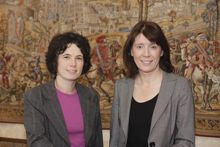2009 Press Releases
02.11.2009
A researcher at University College Cork, Dr Geraldine Boylan, will jointly lead a €7.5 million international project to develop new drug treatments for seizures in newborn babies.
The research will be a major boost for paediatric drug development in Europe because seizures are more common in the neonatal period than any other time throughout life and the drugs currently used, though often ineffective, have not changed over the past 50 years.
The incidence of seizures in babies born at full term (40 weeks) is 1.5-3.0 per 1,000 births: however the incidence is even higher in the more vulnerable group of premature babies, ranging from 50-150 per 1,000 live births. “These figures probably underestimate the problem as they only include the seizures that can be observed. We now know that most neonatal seizures are very subtle and can only be detected accurately by monitoring brain wave activity” says Dr Boylan, a senior academic at the School of Medicine at University College Cork and Head of the Neonatal Brain Research Group at Cork University Maternity Hospital.
The research will involve a European-wide, multicentre clinical trial to evaluate the efficacy and safety of bumetanide in the treatment of seizures in the newborn. Bumetanide has enjoyed wide use for over 30 years as a diuretic in adults and children. Recent research suggests that it may also be effective in the treatment of seizures in the newborn when combined with phenobarbitone. The project will evaluate the safety and efficacy of bumetanide for seizure control in this age group.
It is widely recognised that clinical trials, in general, target adults and that insufficient clinical trials are done on the paediatric population and fewer still focus on newborn babies. Most drugs used to treat seizures in babies are ‘unlicensed’ or ‘off-label’ as their efficacy and safety has not been established in this age group. Over the last 15 years only one new seizure drug has been approved for children less than two years of age and none have been approved for babies. "This will be the first time that experts from different European countries will collaborate to overcome the ethical and logistical challenges involved in anticonvulsant drug development for babies. We will carefully track the progress and neurological development of these babies which is equally important” says Dr Boylan.
Seizures in the very young differ from those in adults in terms of causation, clinical features and, perhaps most importantly, long-term consequences. Drug metabolism differs in the young and this can be particularly challenging. Consequently the recent European Union FP7 health call was welcomed by all paediatric health care professionals. According to Dr Boylan, “we face an ethical predicament with regard to drug therapy in children and in particular in babies: on the one hand they need protection from the potential risks of unnecessary research, but on the other hand they may be harmed when given inadequately studied medicines. In addition, more effective modern medicines are currently withheld because they have not been studied in this patient group.”
Dr Boylan will jointly coordinate the NEMO (Treatment of NEonatal seizures with Medication Off patent) project with Dr Ronit Pressler from the Institute of Child Health, University College London. Drs Boylan and Pressler have also recruited other experts in the field of neonatal neurology from universities and research institutes in the United Kingdom, Sweden, Finland, France, Germany, Ireland, and the Netherlands to participate in the research. In addition, there is one North American partner from Duke Clinical Research Institute. The participants have expertise in the fields of neonatology, paediatric pharmacology, neonatal neurophysiology, paediatric epileptology, and paediatric neurodevelopmental assessment covering all the relevant areas necessary for the project. Clinical leads for the project will be Dr Brendan Murphy and Dr Deirdre Murray and this research project will also involve a unique collaboration with the Boole Centre for Research in Informatics at UCC.
Over the last few years, the Neonatal Brain Research Group has been instrumental in developing methods to detect seizures in newborn babies more accurately and to monitor these seizures http://www.ucc.ie/en/neonatalbrain/. The next phase of the group's research aims to develop safe and effective drugs to treat these seizures in babies.
The project has been funded through the EU FP7 Health call ‘Adapting off-patent medicines to the specific needs of paediatric populations.’ The need for a neonatal anti-convulsant clinical trial has long been recognised and is now possible because of the European funding. Many members of this consortium have worked together before on smaller projects and have a track record of productive collaboration.
RMcD
Picture shows L-R: Dr Ronit Pressler, Institute of Child Health, University College London and Dr Geraldine Boylan, School of Medicine, UCC

